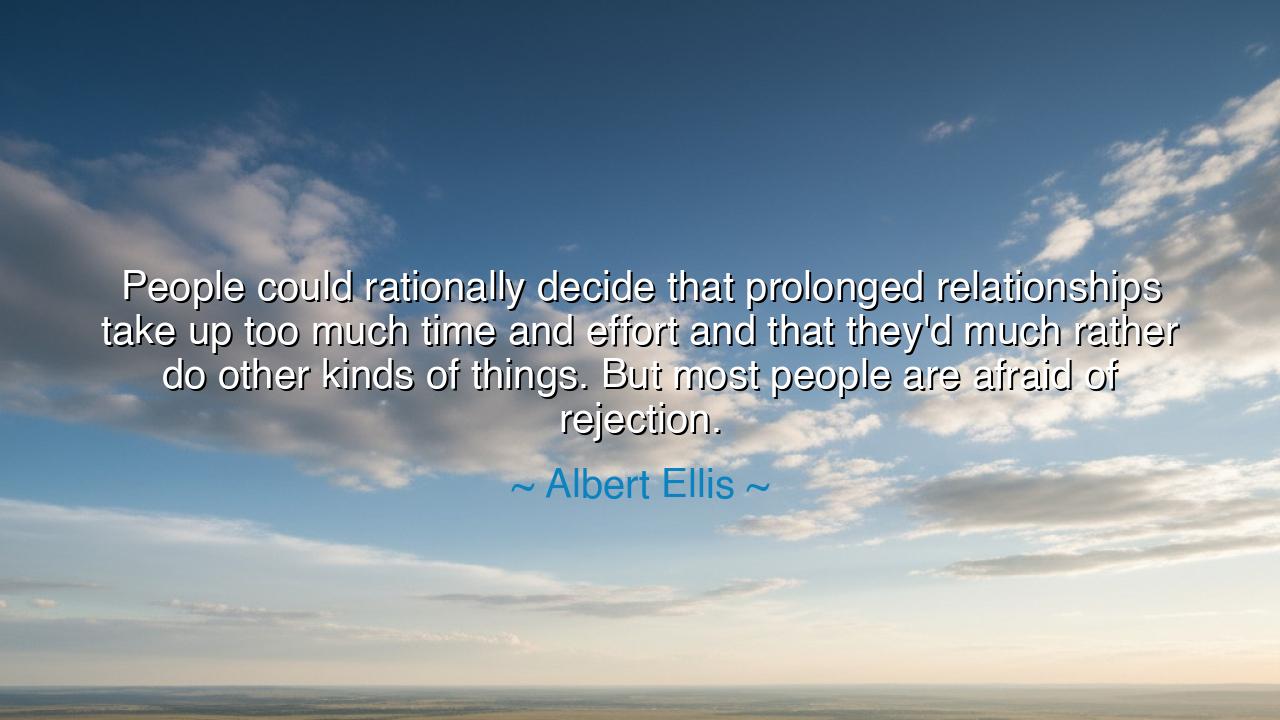
People could rationally decide that prolonged relationships take
People could rationally decide that prolonged relationships take up too much time and effort and that they'd much rather do other kinds of things. But most people are afraid of rejection.






In the piercing words of Albert Ellis, the father of Rational Emotive Behavior Therapy, we hear the voice of both philosopher and healer: “People could rationally decide that prolonged relationships take up too much time and effort and that they’d much rather do other kinds of things. But most people are afraid of rejection.” Beneath this simple observation lies a profound understanding of the human spirit — that even when reason shows one path, emotion often chains us to another. Ellis, who devoted his life to studying the storms within the human mind, saw clearly that our suffering often springs not from the world itself, but from our fear — fear of failure, fear of loss, and most of all, fear of being unwanted.
At its core, Ellis’s quote is not about cynicism toward love or relationships, but about self-awareness. He recognized that human beings possess the power to choose — to weigh their desires and decide how they wish to live. Yet few truly exercise this freedom. Why? Because the fear of rejection — of being unseen, unloved, or left behind — binds even the most rational mind. This fear is not new. It is ancient, woven into the fabric of our survival. The earliest humans depended upon acceptance within the tribe; exile meant death. Even now, though we live in cities of millions, the old instinct remains: the terror of being alone. Thus, Ellis reminds us that rational freedom is possible only when we learn to conquer this ancestral fear.
The ancients themselves wrestled with this same paradox — the battle between reason and emotion. The Stoic philosopher Epictetus taught that the wise man should desire only what lies within his control, yet even he admitted that the heart resists such discipline. Love and attachment bring both joy and vulnerability. A person might see, with perfect clarity, that certain relationships bring only pain or distraction, that the pursuit of affection consumes energy better spent on growth or purpose — and yet, the moment they feel unloved, their calm dissolves into longing. Ellis understood this ancient tension. His wisdom was not to scorn emotion, but to illuminate it, to teach that mastery of life comes not by denying our feelings, but by refusing to be ruled by them.
Consider the story of Marcus Aurelius, the philosopher-king of Rome. Surrounded by war, intrigue, and loss, he often wrote in his journals of his deep longing for peace and simplicity. Yet he knew that attachment — to people, possessions, or praise — would disturb his serenity. “When you are offended at any man’s fault,” he wrote, “turn to yourself and study your own failings.” Marcus, like Ellis, understood that we suffer not because others reject us, but because we believe rejection diminishes our worth. The wise man learns to stand whole even when unloved, for his value does not depend on the eyes of others, but on the clarity of his own soul.
Ellis’s insight also reveals a modern truth — that much of what we call love is often driven by fear, not by freedom. Many stay in unfulfilling relationships not because they bring joy, but because they dread solitude. Others chase affection endlessly, hoping that being desired will heal their sense of inadequacy. Yet love born from fear cannot flourish; it becomes a cage, not a sanctuary. The truly rational soul, Ellis suggests, is one who has faced rejection and learned to survive it — one who can stand alone without bitterness, who can choose connection not from need, but from abundance. To such a person, relationships become acts of freedom, not desperation.
In his life, Ellis embodied this philosophy. Known for his blunt, direct style, he often told his patients uncomfortable truths — that their pain was not caused by others, but by their own beliefs about others. He urged them to replace thoughts of helplessness with thoughts of agency. “You have the power,” he would say, “to think differently.” This was not cruelty; it was liberation. Just as a healer must sometimes cleanse a wound with fire, Ellis’s words burned away illusions to reveal the strength beneath. In reminding us that people fear rejection more than they fear stagnation, he invites us to examine our choices: are we living by design, or by fear?
The lesson, then, is this: do not let the fear of rejection govern your heart. Choose your relationships not from fear of being alone, but from the desire to share freely. If love requires all your time and peace, it is not love, but dependence. If solitude terrifies you, it is not solitude you must escape, but your own insecurity. To master life, you must first master your mind, and to master your mind, you must face the things that frighten it most. Learn to stand in rejection and remain whole, to walk alone and still feel worthy.
So, dear listener, remember the wisdom of Albert Ellis. The rational path is not cold, but courageous — it is the path of those who choose clarity over comfort, truth over illusion. Let rejection no longer be a wound, but a mirror — reflecting not your inadequacy, but your independence. For when you no longer fear being unloved, you become truly free to love. And in that freedom, life itself unfolds — not as a chain of dependencies, but as a dance of choice, confidence, and authenticity.






AAdministratorAdministrator
Welcome, honored guests. Please leave a comment, we will respond soon